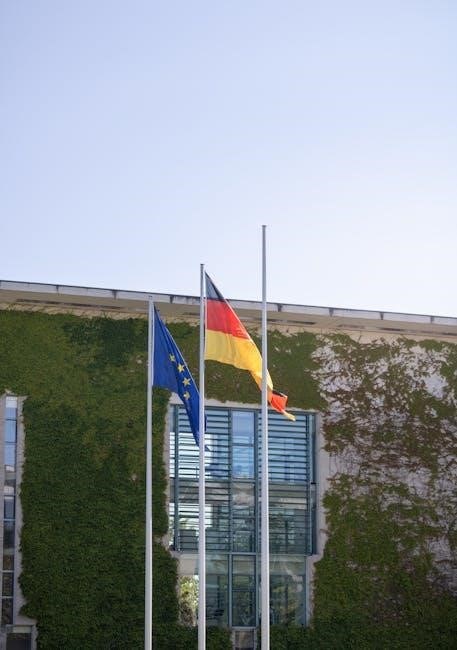The NCAA International Guide is a comprehensive resource designed to help international student-athletes navigate eligibility‚ recruitment‚ and academic requirements for NCAA participation in the United States․
Overview of the NCAA International Student-Athlete Program
The NCAA International Student-Athlete Program provides a structured pathway for global students to compete in U․S․ colleges․ It ensures compliance with academic and athletic standards‚ promoting fairness and inclusion․ The program offers resources like the International Student-Athlete Handbook and webinars to guide eligibility processes․ Over 25‚000 international athletes currently participate‚ benefiting from cultural adaptation support and academic advising․ This initiative fosters diversity and excellence‚ enabling international students to thrive both on and off the field while meeting NCAA certification requirements․
Purpose of the NCAA Guide for International Students
The NCAA Guide for International Students serves as a vital resource‚ outlining eligibility criteria and requirements for global athletes․ It simplifies the complex process of meeting academic and athletic standards‚ ensuring clarity and compliance․ The guide provides detailed information on document submissions‚ core courses‚ and standardized tests․ Its purpose is to empower international students with the knowledge needed to seamlessly transition into U․S․ college athletics‚ ensuring they meet all NCAA certification requirements and achieve their academic and athletic goals effectively․

Eligibility Requirements for International Student-Athletes
The NCAA Guide outlines eligibility requirements‚ including academic standards‚ core courses‚ and document submissions‚ ensuring international students meet all necessary criteria for participation in college athletics․
Academic Standards for International Eligibility
The NCAA has established specific academic standards for international student-athletes to ensure eligibility․ International students must complete core courses equivalent to U․S․ standards‚ maintain a qualifying GPA‚ and achieve required SAT or ACT scores․ Transcripts and proof of graduation must be submitted for evaluation․ The NCAA Eligibility Center reviews academic documents to verify compliance with these standards‚ ensuring international athletes meet the same academic criteria as U․S․ students for NCAA participation․
Required Documents for NCAA Initial Eligibility
International student-athletes must submit specific documents for NCAA eligibility‚ including official transcripts‚ proof of graduation‚ and standardized test scores․ Transcripts must detail coursework and grades‚ while graduation certificates confirm completion of secondary education․ SAT or ACT scores are also required for eligibility․ Documents must be in English or officially translated and certified by the issuing institution or a recognized authority․ These materials are reviewed by the NCAA Eligibility Center to verify academic qualifications and ensure compliance with eligibility standards․
Understanding the NCAA Eligibility Process
The NCAA Eligibility Process involves evaluating academic and athletic qualifications of international student-athletes․ The NCAA Eligibility Center reviews transcripts‚ test scores‚ and course completion to ensure compliance with NCAA standards․ International students must meet specific academic requirements‚ including core coursework and GPA benchmarks․ The process also includes verifying amateur status and ensuring no professional participation․ Understanding this process helps students prepare necessary documents and meet deadlines‚ ensuring smooth transition to NCAA participation․ Proper preparation and adherence to guidelines are crucial for successful eligibility determination․

Registration and Initial Eligibility
International student-athletes must create an account with the NCAA Eligibility Center and submit required documents to determine eligibility for NCAA participation․ This process ensures compliance with academic and amateurism standards‚ allowing students to compete and access scholarships․
How to Register as an International Student-Athlete
International student-athletes must create an account on the NCAA Eligibility Center website․ They should provide personal and academic information‚ including high school transcripts and standardized test scores․ Additionally‚ they need to submit proof of graduation and any necessary international academic documents․ The registration process also requires paying a fee and completing an amateurism questionnaire․ Once registered‚ students can monitor their eligibility status and communicate with NCAA member schools for recruitment opportunities․ Proper documentation and timely submission are crucial for a smooth registration process․
Steps for International Students to Achieve NCAA Eligibility
International students must meet academic standards‚ including completing core courses and achieving a qualifying grade-point average․ They should submit all required documents‚ such as transcripts and test scores‚ to the NCAA Eligibility Center․ Completing the amateurism questionnaire and ensuring all submissions are accurate and timely is essential․ Students should also maintain communication with the Eligibility Center to track their status and address any issues promptly․ Following these steps ensures a smooth process toward achieving NCAA eligibility․
Role of the NCAA Eligibility Center
The NCAA Eligibility Center evaluates international student-athletes’ academic credentials to determine eligibility for NCAA participation․ It verifies transcripts‚ test scores‚ and course completion‚ ensuring compliance with NCAA standards․ The center also provides resources‚ such as webinars‚ to guide international students through the eligibility process․ By reviewing each student’s academic history‚ the Eligibility Center plays a crucial role in maintaining fair academic standards across all NCAA institutions․ Its decisions are final and essential for international students to compete at the collegiate level in the U․S․

Core Courses and Academic Requirements
Core courses are crucial for NCAA eligibility‚ requiring 16 approved high school courses in English‚ math‚ science‚ and social science‚ aligning with NCAA academic standards․
Core Course Requirements for International Students
International students must complete 16 core courses‚ including English‚ math‚ science‚ and social science‚ as outlined by the NCAA․ These courses must be approved by the NCAA Eligibility Center․ Transcripts and proof of completion are essential for eligibility․ International students should ensure their coursework aligns with NCAA standards‚ as non-traditional courses may not qualify․ The NCAA provides resources to help international students verify their academic credentials and meet these requirements effectively․
GPA Calculation for International Transcripts
The NCAA calculates GPA for international students based on official transcripts converted to a 4․0 scale․ International grades are evaluated and standardized by the NCAA Eligibility Center․ Transcripts must be submitted in their original language with certified English translations․ The center uses guidelines to determine equivalent course grades‚ ensuring fairness and consistency for all applicants․ Meeting the minimum GPA requirement is crucial for eligibility‚ so international students should carefully review their academic records before submission․
Standardized Test Scores (SAT/ACT) for International Applicants
International applicants must submit SAT or ACT scores to the NCAA Eligibility Center․ Test scores must be officially reported using NCAA’s code (9999)․ For SAT‚ the Evidence-Based Reading and Writing (ERW) and Math scores are used․ ACT requires the composite score․ Minimum scores are required for eligibility‚ though specific thresholds vary by division (I or II)․ Scores must meet NCAA’s academic standards to ensure competitive eligibility‚ aiding in the evaluation of a student’s readiness for college-level coursework in the U․S․ education system․
Role of International Student-Athletes
International student-athletes balance athletics and academics‚ adhering to NCAA standards‚ while contributing uniquely to their teams and institutions‚ enriching campus culture and competition․
Expectations for International Student-Athletes
International student-athletes are expected to balance academic excellence with athletic performance‚ adapting to U․S․ academic and cultural norms․ They must meet NCAA eligibility standards‚ maintain a strong GPA‚ and complete core courses․ Cultural adaptation and overcoming language barriers are key to success․ Student-athletes are also expected to serve as ambassadors for their home countries‚ fostering diversity and inclusion within their teams and institutions․ They must stay informed about NCAA rules and regulations to maintain eligibility and seek support when needed to thrive in both academics and athletics․
Academic Responsibilities of International Student-Athletes
International student-athletes must meet NCAA academic standards‚ including completing required core courses and maintaining a minimum GPA․ They are responsible for submitting official transcripts and ensuring their academic credentials align with NCAA eligibility criteria․ Time management is crucial to balance athletics and academics․ Student-athletes must stay informed about academic deadlines and requirements‚ seek academic advising‚ and utilize available resources to maintain eligibility․ Academic integrity and compliance with NCAA rules are essential for their success in both sports and education․
Maintaining NCAA Eligibility as an International Student
Maintaining NCAA eligibility requires international students to meet ongoing academic and regulatory standards․ Student-athletes must pass required core courses‚ maintain a minimum GPA‚ and ensure timely progression toward their degree․ Compliance with NCAA rules‚ including amateurism and recruiting guidelines‚ is essential․ Regular communication with academic advisors and the NCAA Eligibility Center helps monitor progress․ Additionally‚ staying informed about eligibility updates and deadlines ensures uninterrupted participation in collegiate athletics․ Proactive planning and adherence to NCAA policies are key to sustaining eligibility throughout their academic and athletic journey․

NCAA Resources for International Students
The NCAA provides essential resources‚ including the International Student-Athlete Handbook‚ webinars‚ and academic advising‚ to support international students in navigating eligibility and academic requirements successfully․
NCAA International Student-Athlete Handbook
The NCAA International Student-Athlete Handbook is a first-of-its-kind resource designed to equip incoming international student-athletes with essential information․ It provides detailed guidance on eligibility‚ academic standards‚ and document submission processes․ The handbook also covers cultural adaptation‚ recruitment‚ and maintaining eligibility․ Available as a downloadable PDF‚ it serves as a valuable tool for international students aiming to compete in the NCAA․ This comprehensive guide ensures students are well-prepared to navigate the transition to U․S․ academic and athletic systems seamlessly․
Webinars and Guides for International Applicants
The NCAA offers webinars and guides tailored for international applicants‚ providing insights into eligibility requirements‚ core courses‚ and document submission processes․ These resources help students and their families understand academic standards and recruitment procedures․ The NCAA Initial-Eligibility Webinar is particularly useful‚ offering in-depth guidance for international college-bound student-athletes․ Additionally‚ the NCAA Guide to International Academic Standards for Athletics Eligibility outlines necessary steps for eligibility‚ ensuring a smooth transition to U․S․ academic and athletic systems․ These tools are essential for navigating the NCAA process successfully․
Academic Advising for International Student-Athletes
Academic advising is crucial for international student-athletes to thrive in the U․S․ education system․ The NCAA provides resources‚ such as the International Student-Athlete Handbook‚ to guide students through academic expectations and eligibility requirements․ Academic advisors help students create personalized plans‚ ensuring they meet NCAA core course requirements and maintain satisfactory progress․ These services also assist with language barriers and cultural adaptation‚ enabling international student-athletes to balance athletics and academics effectively while navigating the transition to a new educational environment․
Transcripts and Document Submission
International student-athletes must submit official transcripts and required academic documents for NCAA eligibility evaluation‚ ensuring all records meet specified standards and guidelines for accurate assessment․
Required Academic Documents for International Students
International student-athletes must submit official transcripts‚ course syllabi‚ and graduation certificates for NCAA eligibility․ Standardized test scores‚ such as SAT/ACT‚ and proof of English proficiency (e․g․‚ TOEFL/IELTS) are also required․ Additionally‚ documents like proof of graduation and academic records from non-U․S․ institutions must be translated and certified․ The NCAA Eligibility Center verifies these documents to ensure they meet academic standards for participation in college athletics․ Submitting these materials accurately and promptly is crucial for a smooth eligibility process․
Guidelines for Submitting International Transcripts
International students must submit official‚ translated‚ and certified academic transcripts to the NCAA Eligibility Center․ Transcripts should include all coursework‚ grades‚ and graduation certificates․ Documents must be translated into English by a certified translator if necessary․ Students can submit transcripts electronically or by mail‚ but they must be sealed and directly from the issuing institution․ Ensure all documents are received by the NCAA before deadlines to avoid delays in eligibility determination․
Choosing the Right College
Selecting the right college involves considering academic fit‚ athletic programs‚ location‚ and support for international students․ The NCAA guide helps match student-athletes with suitable institutions․
Factors to Consider When Selecting an NCAA College
When selecting an NCAA college‚ international student-athletes should consider academic programs‚ athletic division levels‚ geographic location‚ cultural support‚ and available scholarships․ Assessing the college’s size‚ faculty expertise‚ and resources is also crucial․ Additionally‚ understanding the institution’s commitment to international students and their success can significantly impact the overall experience․ Prioritizing factors like team dynamics‚ coaching styles‚ and campus community helps ensure a balanced academic and athletic career in the U․S․
Understanding NCAA Divisions (I‚ II‚ III)
NCAA Divisions (I‚ II‚ III) differ in competitive level‚ resources‚ and scholarship opportunities․ Division I offers the highest competition and full scholarships‚ while Division II balances athletics and academics with partial scholarships․ Division III focuses on student-athlete experience without athletic scholarships․ Each division provides unique opportunities‚ allowing international athletes to choose based on their goals‚ skill level‚ and academic priorities․ Understanding these differences helps in making informed decisions about where to compete and study in the U․S․

The Recruitment Process
The recruitment process involves coaches identifying talent‚ reaching out to prospects‚ and evaluating academic and athletic qualifications to offer opportunities for international student-athletes to compete in the U․S․
How International Student-Athletes Get Recruited
International student-athletes are often identified through international competitions‚ showcases‚ and recommendations․ Coaches and scouts review highlight reels and academic records to assess potential․ The NCAA Eligibility Center verifies academic and athletic credentials‚ ensuring compliance with eligibility standards․ Many international athletes connect with coaches through networking‚ camps‚ or recruitment agencies․ Understanding NCAA guidelines and maintaining strong academic performance are crucial for attracting college programs․ Additionally‚ online platforms and recruitment tools help bridge the gap between international talent and U․S․ colleges․
Strategies for International Students to Increase Recruitment Chances
International students can enhance their recruitment chances by researching NCAA schools‚ reaching out to coaches early‚ and showcasing athletic skills through highlight reels․ Maintaining strong academic performance and understanding NCAA eligibility requirements is essential․ Utilizing the NCAA Eligibility Center and attending international recruiting events can also increase visibility․ Building a strong online presence and leveraging social media to connect with coaches are effective strategies․ Additionally‚ seeking guidance from experienced mentors or recruitment agencies can provide valuable insights and support throughout the process․
Timeline for NCAA Recruitment
International student-athletes should start their NCAA recruitment process early‚ ideally during their sophomore or junior year․ Researching schools and reaching out to coaches by email or social media is key․ Creating highlight reels and attending showcases can increase visibility․ Official recruitment begins in the senior year‚ with coaches extending offers․ Spring is crucial for finalizing commitments․ The NCAA Eligibility Center reviews transcripts and test scores‚ ensuring eligibility before participation․ Staying organized and proactive throughout the process maximizes opportunities for successful recruitment and placement․

Financial Aid and Scholarships
The NCAA offers various financial aid options for international student-athletes‚ including athletic scholarships‚ grants‚ and university-funded programs to support their education and athletic pursuits in the U․S․
Available Financial Aid for International Student-Athletes
International student-athletes can access various forms of financial aid‚ including NCAA athletic scholarships‚ federal grants‚ and institutional aid․ Many colleges offer merit-based and need-based scholarships specifically for international students․ Additionally‚ some universities provide assistance through international student programs․ The NCAA also partners with organizations to offer grants and awards to eligible student-athletes․ It’s important to explore all available options and consult with the college’s financial aid office to maximize support․
Understanding NCAA Athletic Scholarships
NCAA athletic scholarships are awards that cover tuition‚ fees‚ room‚ and board for student-athletes․ These scholarships are offered to talented athletes who demonstrate exceptional skill in their sport and meet NCAA eligibility requirements․ International students are eligible to receive these scholarships‚ which are typically awarded by coaches based on athletic performance and academic qualifications․ Scholarships can be full or partial‚ depending on the institution and the athlete’s abilities․ Understanding the terms and conditions is crucial for international students to maximize their opportunities and comply with NCAA regulations․
Cost of Attendance for International Students
The cost of attendance for international student-athletes includes tuition‚ fees‚ room‚ board‚ and other expenses․ These costs vary by institution and location‚ with urban schools often having higher living expenses․ NCAA scholarships can help cover these costs‚ but understanding the total financial commitment is essential for planning․ International students should research specific schools and utilize NCAA resources to estimate expenses accurately and explore available financial aid options to manage their academic and athletic pursuits effectively․

Adapting to the US Academic System
International student-athletes face cultural and academic adjustments in the US․ Understanding differences in teaching styles‚ grading systems‚ and academic expectations is crucial for success․ Seeking guidance from advisors and utilizing campus resources can ease the transition and help students thrive academically and athletically․
Cultural Adaptation for International Student-Athletes
Cultural adaptation is a key challenge for international student-athletes in the U․S․ Understanding local customs‚ communication styles‚ and societal norms is essential․ The NCAA provides resources‚ such as the International Student-Athlete Handbook‚ to ease this transition․ Student-athletes often face language barriers and homesickness‚ requiring support systems to navigate these challenges․ Balancing athletic commitments with cultural integration and academic responsibilities is crucial․ Many colleges offer cultural orientation programs and counseling services to help international student-athletes adapt successfully to their new environment and thrive both on and off the field․
Overcoming Language Barriers
Language barriers can pose significant challenges for international student-athletes․ To address this‚ the NCAA offers resources such as language workshops and tutoring programs․ Many colleges provide English language support services to help student-athletes improve their communication skills․ Additionally‚ peer mentoring programs connect international students with native English speakers‚ fostering mutual understanding․ Leveraging these tools enables student-athletes to excel academically and athletically while navigating cultural differences․ Effective communication is key to success‚ and these resources help bridge the gap for international student-athletes adapting to the U․S․ academic and athletic environment․
Time Management for International Student-Athletes
Time management is crucial for international student-athletes balancing academics‚ athletics‚ and cultural adaptation․ The NCAA recommends creating structured schedules to prioritize tasks‚ ensuring adequate time for studying‚ practice‚ and rest․ Utilizing digital calendars and to-do lists can help organize responsibilities effectively․ Colleges often provide academic advisors and mentors to assist with balancing commitments․ By mastering time management‚ student-athletes can maintain eligibility‚ perform well academically‚ and excel in their sports while navigating their new environment successfully․

Success Stories
Notable international student-athletes have excelled in NCAA sports‚ achieving academic and athletic excellence․ Their journeys inspire future generations to pursue their dreams in the United States․
Notable International Student-Athletes in the NCAA
International student-athletes like Rui Hachimura from Japan and Sabrina Ionescu from Romania have made significant impacts in NCAA sports․ Their achievements inspire global talent to pursue NCAA opportunities․
Case Studies of Successful International NCAA Athletes
Case studies highlight athletes like Duke University’s International Student-Athletes who excelled academically and athletically․ Their journeys demonstrate the challenges and triumphs faced by international recruits in the NCAA system․

The Future of International Student-Athletes in the NCAA
The future of international student-athletes in the NCAA is promising‚ with growing participation‚ new support systems‚ and a significant impact on college athletics and cultural exchange․
Trends in International Participation in NCAA Sports
International participation in NCAA sports is growing steadily‚ with over 25‚000 students currently competing․ This trend reflects the globalization of athletics and the NCAA’s commitment to inclusivity․ The influx of international athletes enriches team dynamics and fosters cultural exchange․ Resources like the NCAA International Student-Athlete Handbook and webinars have streamlined the eligibility process‚ attracting more global talent․ As participation rises‚ the NCAA continues to adapt‚ ensuring equitable opportunities for all athletes‚ regardless of origin‚ to excel both on and off the field․
Impact of International Student-Athletes on College Athletics
International student-athletes bring diverse skills‚ cultures‚ and perspectives‚ enhancing college athletics’ global appeal․ Their presence fosters teamwork and cultural understanding among teams․ Academically‚ they raise institutional profiles‚ contributing to vibrant campus communities․ Their success inspires future generations‚ promoting the NCAA’s mission of inclusivity and excellence․ This enrichment benefits not only athletics but also the educational landscape‚ creating a more dynamic and interconnected environment for all students․
